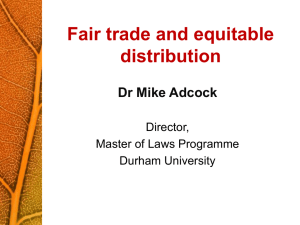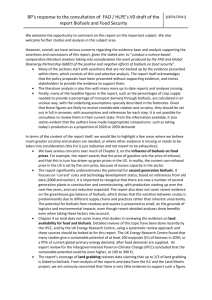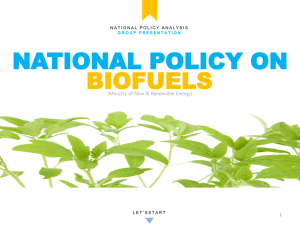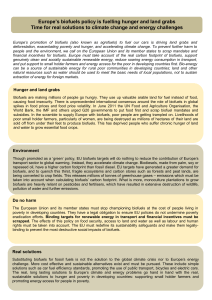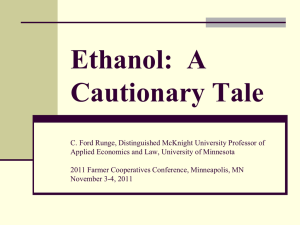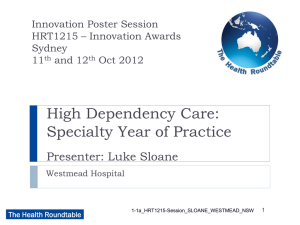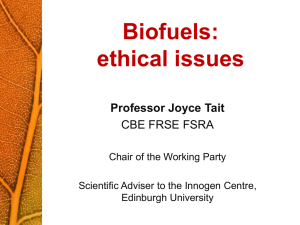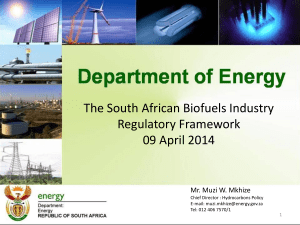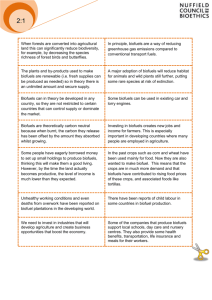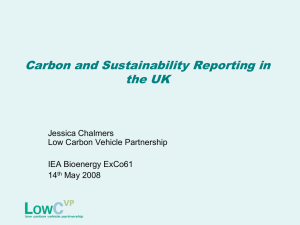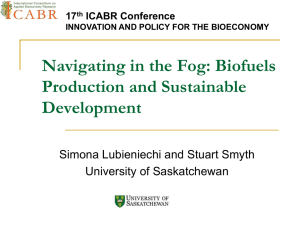Roundtable on Sustainable Biofuels - 5th World Water Forum Content
advertisement
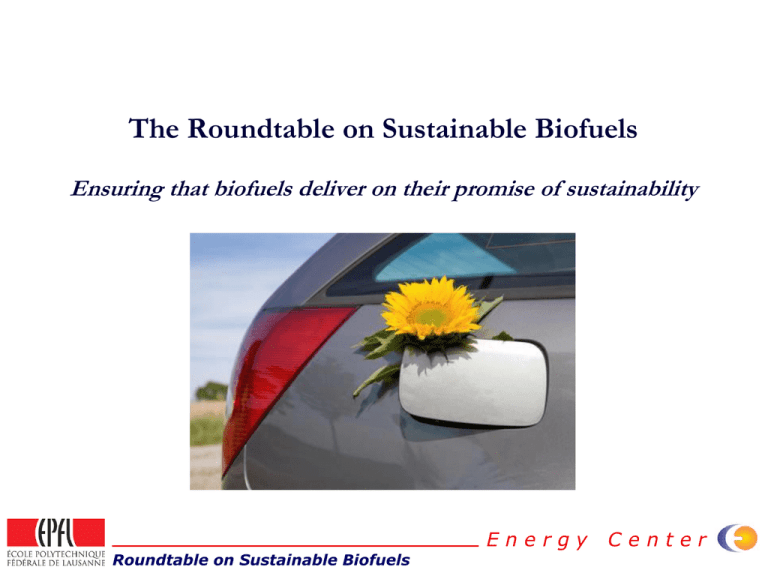
The Roundtable on Sustainable Biofuels Ensuring that biofuels deliver on their promise of sustainability Roundtable on Sustainable Biofuels Energy Center The Roundtable on Sustainable Biofuels We are an international multi-stakeholder initiative developing principles and criteria for sustainable biofuels production that will be: • Simple, accessible and implemented worldwide • Generic to all crops • Adaptable to new information • Efficient and cheap to measure • In line with WTO rules (use ISEAL code) • 4 Working Groups – GHG, Social, Environment and Implementation Roundtable on Sustainable Biofuels Energy Center Version Zero - RSB Standard Direct National Law (especially land, labor, water rights) Community Consultation (especially to determine land rights, social & environmental impact, idle land, resolve grievances) Social – biofuels should benefit rural communities and workers should not contribute to food insecurity Indirect GHG - significantly better over lifecycle than fossil fuel Environmental – conserve and protect soil, water, air conserve and protect high conservation values Technology – (esp. biotech) should be used responsibly and transparently, contribute to income or sustainability Economic Efficiency improvement - economically viable, continuous Roundtable on Sustainable Biofuels Energy Center Roundtable on Sustainable Biofuels - Draft Scorecard Concept Overall Energy and Greenhouse Gas Efficiency Total score for product lifecycle (well-to-wheel) Consider able reduction of ecolog./ social footprint Small or no reduction on ecolog./ social footprint No or negative impact on ecolog./ social footprint Low GHG emissions, maximize carbon sequestration (e.g. low-till) 10-90% GHG emissions as compared to fossil fuel High N2O emissions from fertilizers, conversion of high carbon-stock land Conservation of Natural Resources biodiversity Biodiversity corridors Buffer zones Social Concerns soil health air quality water use Food security Working conditions Restore degraded land No sig. impact on air quality on farm or at processing facility No sig. impact on local water quality or quantity Use of degraded or idle land Bestpractice wages and working conditions Moderate impact on air quality Moderate impact on local water quality, quality Erosion protection Deforestatn., habitat encroachmt. Roundtable on Sustainable Biofuels Water pollution, significant reduction in water availability Energy Hazardous or illegal working conditions Center Categories 1. 2. 3. 4. Human 5. Rural 6. 7. 8. 9. 10. 11. 12. Land rights Legality Consultation Climate change & labor rights & social development Food security PRINCIPLE Conservation Biofuel production shallSoil optimize surface and groundwater resource use, Water including minimizing contamination or Air depletion of these resources, and shall Technologies not violate existing formal and customary water rights. Roundtable on Sustainable Biofuels Energy Center Water Criteria 9.a The ESIA outlined in 2a shall identify existing water rights, both formal and customary, as potential impacts of the project on water availability within the watershed where the project occurs. Guidance: Downstream water users or ground water users in the area must be identified. No modification of the existing rights can happen without the consent of the parties at stake. 9.b Biofuel production shall include a water management plan appropriate to the scale and intensity of production. Guidance: Water sources located on the production area must be inventoried and mapped. Annual amounts of water withdrawn for biofuel production must be recorded. Roundtable on Sustainable Biofuels Energy Center Water Criteria 9.c Biofuel production shall not deplete surface or groundwater resources. Guidance: The use of water for biofuel production must not be at the expense of the daily basic water needs of local communities. The use and share of water resources for biofuel production must be defined in agreement with local community and water user committees shall be consulted where appropriate. Water used for irrigation or biomass processing must not be withdrawn beyond replenishment capacity of the water table or tank. Water-intensive biofuel crops and biofuel production systems must not be established in water-stressed areas. The most efficient use of water must be sought through the use of crops that fit the local conditions. 9.d The quality of surface and groundwater resources shall be maintained at or enhanced to their optimal level under local conditions. Guidance: The optimal level of quality is to be defined through the consultation of local experts, communities and producers, taking into account local climatic, geologic and ecologic conditions. Adequate precautions must be taken to avoid run-off and contamination of surface and ground water resources, in particular from chemicals. Buffer Zones must be set between production site and surface or ground water resources. Waste water must be adequately Energy Center managed. Roundtable on Sustainable Biofuels It’s not too late for your comments too! See www.bioenergywiki.net Roundtable on Sustainable Biofuels Energy Center Contact Secretariat: rsb@epfl.ch http://EnergyCenter.epfl.ch/Biofuels Roundtable on Sustainable Biofuels Energy Center E25 Supporters Roundtable on Sustainable Biofuels Energy Center

